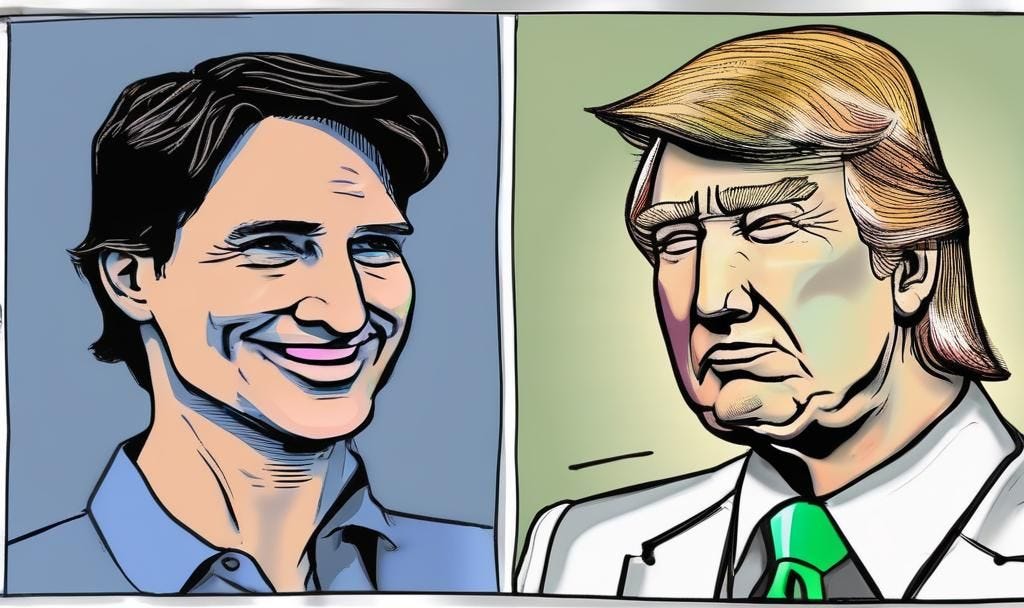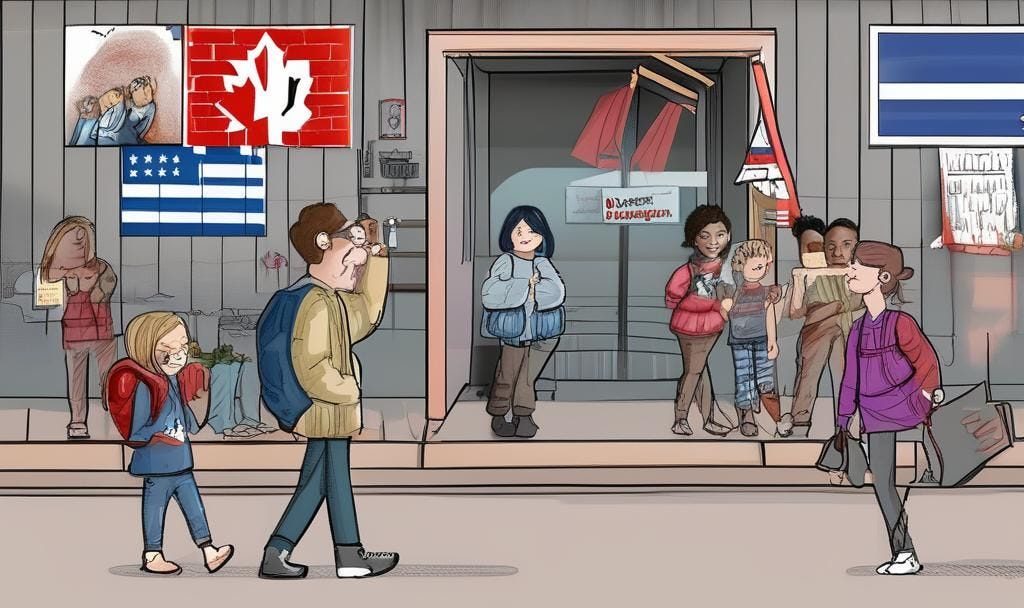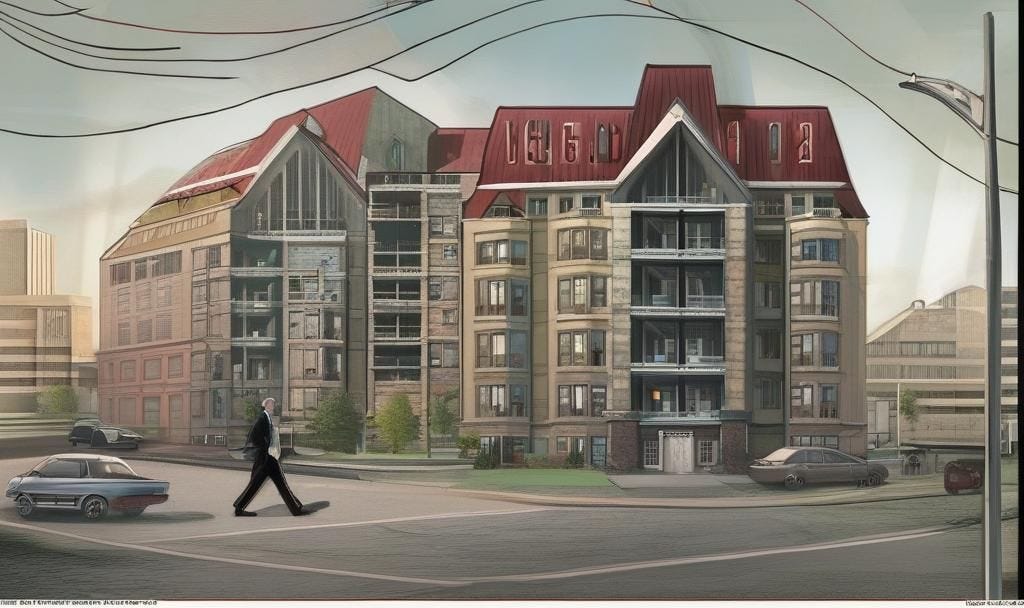The Aftermath of the U.S. Election: Reflections from a Canadian Perspective
It has been nearly a month since the U.S. election, and the reality of Donald Trump’s return to the presidency is settling in for many. The immediate aftermath has been a whirlwind of reactions, from denial to grudging acceptance. For those deeply entrenched in the echo chambers of social media, this outcome has been a harsh wake-up call, reminding them how disconnected some online spaces have become from the realities of life offline.
Platforms like Substack, which have traditionally been havens for thoughtful discourse, are now being flooded by users bringing over the unfiltered chaos of Twitter. Instead of adapting to the more deliberate tone of Substack Notes, many continue to post in the same polarizing manner that drove them away from mainstream platforms.
Yet, amidst this noise, there is a quiet recalibration happening. People are starting to reevaluate their priorities, re-engage with their local communities, and think critically about their role in shaping the next chapter of American history. For Canadians observing this unfold, it’s a moment of reflection on our challenges and the parallels and differences between our two countries.
Fewer Americans Dreaming of Moving to Canada
One of the most significant shifts post-election has been the decline in discussions about moving to Canada as a solution to political dissatisfaction in the U.S. Historically, Canada has been seen as a progressive, welcoming alternative. However, the romanticized notion of Canada often fails to align with the on-the-ground realities.
After conducting their research, many Americans have realized that the barriers to moving north are substantial. While Canada remains an appealing idea for some, the practicalities of immigration have proven to be daunting.
Key Barriers to Moving to Canada
A Challenging Job Market
Canada’s job market is anything but welcoming. Stagnation has become the norm, with high unemployment and underemployment rates affecting both locals and immigrants. Many skilled professionals struggle to find work that matches their qualifications, leaving them to settle for positions far below their expertise.An Expensive Housing Market
Canada’s housing crisis is a significant deterrent. Real estate prices have skyrocketed, making homeownership a distant dream for many. Unlike the U.S., Canada does not offer 30-year fixed-rate mortgages, forcing homeowners to renew their terms every few years, often at higher interest rates. Renters fare no better, with rising rents fueled by demand and investor-friendly policies.Political Uncertainty
The political landscape in Canada is shifting. With the Liberal government under Justin Trudeau facing growing dissatisfaction, the possibility of a right-wing government replacing it has left potential immigrants reconsidering their plans. For Americans seeking stability and progressive policies, Canada’s future feels increasingly uncertain.
Who Still Moves to Canada?
Despite these challenges, a select few Americans continue to make the move. These are typically:
High-net-worth individuals who can afford the transition.
Professionals with job transfers to Canadian offices.
Those with Canadian relatives who provide a support network.
For the vast majority, however, the reality is staying in the U.S., working to resist an incoming MAGA government, or seeking alternative destinations better aligned with their financial and personal goals.
Canada’s Housing Crisis: A Closer Look
The housing market in Canada is one of the most pressing issues facing residents and newcomers alike. The combination of population growth, speculative investments, and short-term mortgage regulations has created a perfect storm of unaffordability.
Why Housing Is So Expensive
Rapid Population Growth
Canada’s immigration policies have led to a surge in population without adequate planning for housing and infrastructure. This mismatch has created overwhelming demand, driving prices higher.Investor-friendly Policies
Corporations and wealthy individuals continue to purchase properties for rental income, reducing the availability of homes for potential buyers.Short-term Mortgages
Unlike the U.S., Canada relies heavily on adjustable-rate mortgages with renewal periods as short as five years. This system leaves homeowners vulnerable to fluctuating interest rates.
My own experience highlights these challenges. Having purchased a small apartment in Hong Kong, I was fortunate to sell it for a good return, which allowed me to secure a down payment on a modest Canadian home. Even so, the transition came at a significant financial cost, and I now face the challenges of periodic mortgage renewals in an economy that offers little stability.
Canada’s Economic Challenges
The sluggish Canadian economy is another major issue. Years of poor policymaking have resulted in what many describe as a "Lost Decade." The signs of stagnation are everywhere, from rising unemployment to declining foreign investment.
The Factors Behind Economic Stagnation
Underutilized Workforce
Many professionals in Canada are either unemployed or underemployed, unable to find jobs that match their skills. This leads to a waste of talent and potential.High Taxes and Cost of Living
Canadians face a heavy tax burden, and inflation has driven up the cost of everyday goods and services. Combined with stagnant wages, this leaves little room for financial growth.Weakened Dollar
A declining Canadian dollar has made imports more expensive, further straining household budgets.
To cope, we’ve had to adopt a frugal lifestyle: cutting back on non-essential expenses like streaming services and dining out. While this has allowed us to maintain some financial stability, it’s a far cry from the prosperity many associate with the "Canadian Dream."
A Growing Wave of Xenophobia
Canada has long prided itself on being a multicultural society. However, recent policies have exposed cracks in this image. Rapid population growth without adequate infrastructure has led to public frustration, much of which is unfairly directed at immigrants.
Challenges Facing Newcomers
Overstretched Public Services
Healthcare wait times have increased, public transit systems are overcrowded, and infrastructure is struggling to keep up with demand.Labor Market Discrimination
Many newcomers find themselves overqualified for the jobs available, facing systemic barriers to career advancement.Anti-Immigrant Sentiment
As communities struggle with housing shortages and job competition, resentment toward immigrants has grown. South Asian immigrants, particularly those from India, have borne the brunt of this backlash.
Unlike the U.S., where Indian immigrants are often celebrated for their STEM expertise and English proficiency, many newcomers to Canada face language barriers and a lack of transferable skills. This has fueled anti-immigrant sentiment even within Canada’s established South Asian communities.
This shift is disheartening for newcomers who arrive full of hope, only to face a reality far removed from the welcoming image often associated with Canada.
Moving Forward
Canada’s challenges are complex, but they also present opportunities for change. By addressing systemic issues in housing, the economy, and immigration policy, the country can work toward a more sustainable and inclusive future.
For those considering a move to Canada or simply curious about life here it’s important to approach the country with realistic expectations. While there are many positives, the challenges cannot be ignored.
If you found this analysis insightful, subscribe to my Substack for more in-depth explorations of Canadian life, current events, and personal reflections. Together, we can navigate the complexities of living in Canada and push for meaningful change.










I said this somewhere else, I believe Canada is the new Poland. I could be wrong. Maybe things won’t play out as they did before, but it’s quite possible that Trump would take a hostile attempt to take over since he obviously made it clear. He wants to unite Canada as a state. Again, I could be wrong.
And YES I CAN DO That with Conviction